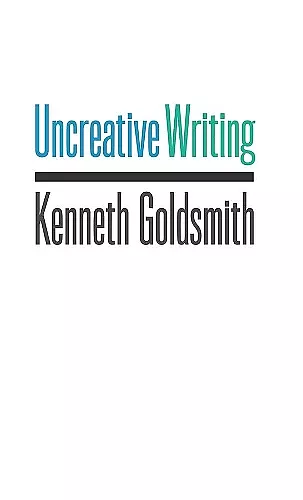Uncreative Writing
Managing Language in the Digital Age
Format:Paperback
Publisher:Columbia University Press
Published:30th Sep '11
Should be back in stock very soon

"The world is full of texts, more or less interesting; I do not wish to add any more."--Kenneth Goldsmith
Can techniques traditionally thought to be outside the scope of literature, including word processing, databasing, identity ciphering, and intensive programming, inspire the reinvention of writing? The Internet and the digital environment present writers with new challenges and opportunities to reconceive creativity, authorship, and their relationship to language. Confronted with an unprecedented amount of texts and language, writers have the opportunity to move beyond the creation of new texts and manage, parse, appropriate, and reconstruct those that already exist. In addition to explaining his concept of uncreative writing, which is also the name of his popular course at the University of Pennsylvania, Goldsmith reads the work of writers who have taken up this challenge. Examining a wide range of texts and techniques, including the use of Google searches to create poetry, the appropriation of courtroom testimony, and the possibility of robo-poetics, Goldsmith joins this recent work to practices that date back to the early twentieth century. Writers and artists such as Walter Benjamin, Gertrude Stein, James Joyce, and Andy Warhol embodied an ethos in which the construction or conception of a text was just as important as the resultant text itself. By extending this tradition into the digital realm, uncreative writing offers new ways of thinking about identity and the making of meaning.
Brilliant and elegant insight into the exact relation of contemporary literary practices and broader cultural changes, explaining how the technologies of distributed digital media exemplified by the World Wide Web have made possible the flourishing of a particular type of literature. -- Professor Craig Dworkin, author of The Consequence of Innovation: Twenty-First-Century Poetics What Goldsmith argues has significant implications for the world of poetry, poetics, and pedagogy. His book contains brilliant moments of exegesis and archival documentation, and its keen attention to, knowledge about, and currency in artistic practice makes it as much a user's manual as a scholar's tome. -- Adalaide Morris, The University of Iowa In these witty, intelligent essays, Goldsmith brings his encyclopedic knowledge of radical artistic practice to bear on how the rise of the internet has irrevocably changed, or should irrevocably change, our existing conceptions of poetry. Goldsmith's practice as artist and critic is deeply interesting. His book is sure to generate lively debate among poets, artists, literary historians, and media theorists. -- Sianne Ngai, University of California, Los Angeles Multimedia artist and executive manager of words, Goldsmith writes a provocative manifesto for writing in the digital era, with a treasure trove of ideas, techniques, and examples that allow us to make it new-again! -- Marcus Boon, author of In Praise of Copying "...a fascinating collection of essays..." Phi Beta Kappa Goldsmith achieves a very difficult feat with this book: he writes lucidly about complex and avant-garde ideas. As a result, he opens up a vital debate for anyone who cares about literature, between notions of traditional creative writing and the set of practices he labels "uncreative writing". -- Douglas Cowie Times Higher Education Selected writers and their practices are reviewed in a series of accessible essays perfect for college-level writers. Midwest Book Review Good. -- James Franco, actor An invigoratingly different style of writing guide, that reveals how jump-starts to one's imagination can be achieved through what seems (at first glance) to be the unlikeliest of means. Library Bookwatch
- Winner of Book Prize 2012
ISBN: 9780231149914
Dimensions: unknown
Weight: unknown
272 pages